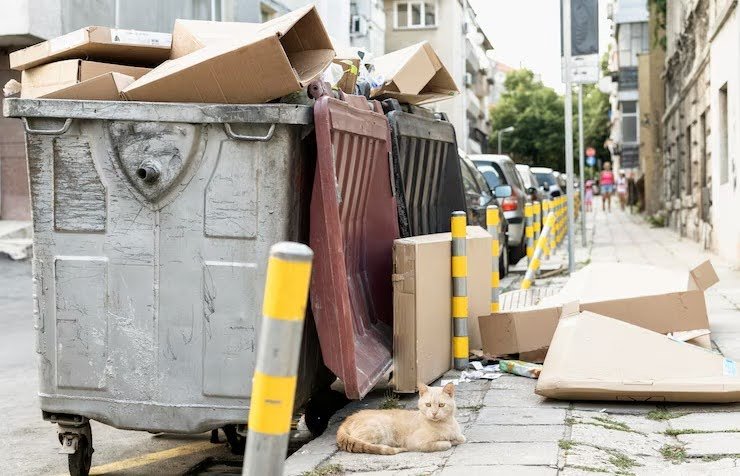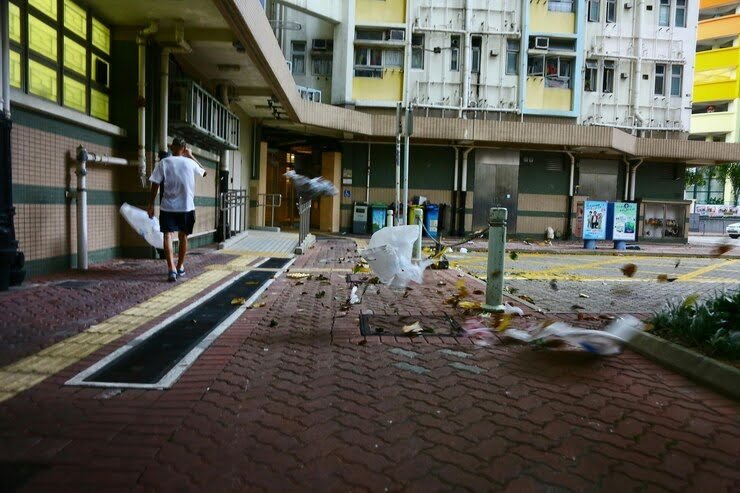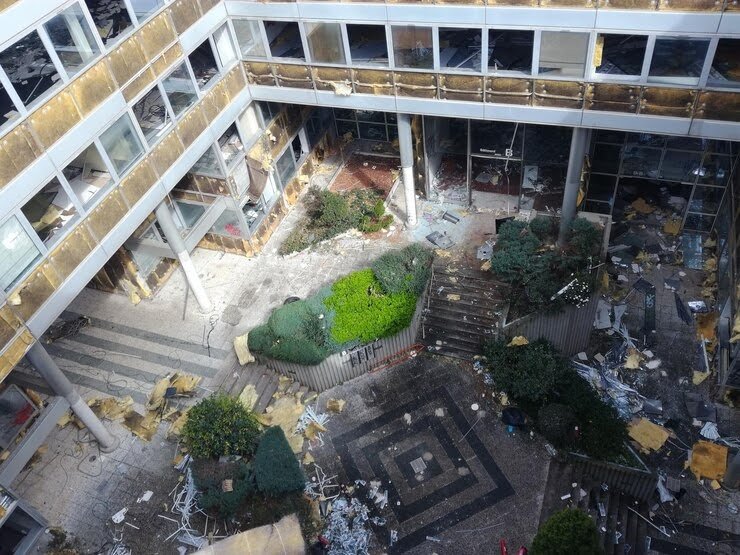
High-rise littering is a serious offence in Singapore, and the penalties are designed to deter individuals from discarding items from tall buildings. It might seem harmless, but throwing objects from a height can significantly harm people and property below.
So, what is the penalty for high-rise littering in Singapore? Let’s explore the consequences and why following local regulations is crucial.
What Is High-Rise Littering?
High-rise littering refers to the act of discarding or throwing objects from windows, balconies, or any elevated areas of a building. In Singapore, this offence is treated seriously due to the potential risks and dangers posed to both public safety and the environment. Here’s a more detailed breakdown:
- Types of Objects: Common items include plastic bags, empty cans, food containers, and even household items like cleaning products or broken furniture. Anything thrown out from a height can pose a danger.
- Public Safety Risk: Objects thrown from high-rise buildings can seriously injure or kill people on the ground, damage vehicles, or break public property. This can lead to significant harm and financial damage.
- Environmental Impact: Littering in public spaces can harm the environment, particularly if waste lands in water bodies, public parks, or other sensitive areas.
Penalty for High-Rise Littering in Singapore

The penalties for high-rise littering in Singapore are strict and meant to discourage individuals from engaging in this unsafe behaviour. Here’s what you can expect if you’re caught:
- High Rise Littering Fine:
- According to the Environmental Public Health Act 1987, the fine for high-rise littering can reach SGD 2,000 for a first-time offence.
- If you are caught littering multiple times, the fine may increase, and the Court may impose harsher penalties.
- High-Rise Littering Offence Penalty:
- Repeat offenders could face even more severe consequences.
- The Court may impose imprisonment if the offender disregards the law, especially if their actions have caused injury or damage.
- In extreme cases, the Court may also order the offender to pay restitution for any damages caused, such as repairing damaged property or compensating injured individuals.
- Other Consequences:
- Community Service: In some instances, offenders may be asked to complete community service as part of their punishment.
- Education Programs: Some offenders may be required to attend educational programmes to raise awareness about the risks associated with high-rise littering and its impact on public safety.
How Can You Avoid a High-Rise Littering Penalty?
Avoiding a high-rise littering penalty is relatively simple if you follow some basic guidelines and responsible waste disposal practices. Here are steps you can take:
- Dispose of Trash Properly:
- Always use designated trash bins or recycling stations to dispose of your waste. Don’t throw anything out of your windows or balconies.
- Proper Waste Disposal: If you’re cleaning or moving out, make sure larger items are disposed of responsibly through authorised collection services.
- Be Mindful of Others:
- If you’re living in a shared building, be considerate of your neighbours and others. High-rise littering could harm or inconvenience people below, and it creates a poor environment for everyone.
- Report Others: If you notice someone else littering from a high-rise, report the incident to your building management or local authorities. Early reporting can help prevent future offences.
- Educate Yourself and Others:
- Familiarise yourself with the penalty for high-rise littering in Singapore and spread awareness among your family or community members.
- Community Initiatives: Participate in or organise local campaigns focused on litter-free living to help improve public awareness of the importance of proper waste disposal.
- Check the Rules of Your Building:
- Some high-rise buildings have specific rules regarding waste disposal and may even provide additional bins or designated areas for bulkier waste. Make sure you’re aware of and follow these rules.
Why Is High-Rise Littering Taken Seriously?

Littering offence in Singapore is considered a serious offence due to the wide-ranging risks and consequences it can cause. While it might seem like a small, harmless act, the effects of discarding objects from a height can be substantial.
Here’s why this issue is treated with such gravity:
- Risk to Public Safety
- Injury or Fatality: Objects thrown from high-rise buildings can cause significant harm to people on the ground. Whether it’s a small item like a plastic bottle or something heavier, the impact can lead to injuries or even fatalities. For instance, something as light as a water bottle can cause serious injury if it hits someone in the head from a great height.
- Damage to Property: In addition to posing a danger to people, falling objects can also damage property, including vehicles, windows, or public spaces. This can result in costly repairs or replacements, creating financial burdens for individuals or businesses.
- Unpredictable Nature: You never know where the objects will land, which is why it’s especially dangerous. A piece of litter can fall in unexpected areas, making it hard to predict the level of harm it could cause.
- Environmental Impact
- Pollution and Littering: High-rise littering contributes to pollution in public spaces. The discarded items may end up in parks, streets, or bodies of water, affecting the cleanliness of the environment. This not only harms the aesthetic value of the area but can also cause long-term environmental damage, especially when non-biodegradable materials are involved.
- Wildlife Risk: Items that fall from buildings may land in areas frequented by wildlife, such as parks or green spaces. Animals may ingest harmful materials, which can lead to injury or death. This can disrupt the local ecosystem and endanger various species.
- Maintaining Singapore’s Clean Reputation
- Public Hygiene: Singapore is known worldwide for its cleanliness and strict laws to maintain that standard. High-rise littering goes against the country’s image as a well-maintained and orderly nation. By taking strong measures against this behaviour, the government reinforces its commitment to cleanliness and public health.
- Legal and Social Expectations: The government has set clear legal expectations to deter people from littering, with substantial penalties in place. By enforcing these laws, Singapore aims to foster a culture of respect for the environment and shared spaces. High-rise littering is seen as a violation of these principles, which is why it’s treated so seriously.
- Impact on Community Well-Being
- Quality of Life: When people litter from high-rise buildings, it affects the overall quality of life in the community. Neighbours or those living nearby may feel unsafe or uncomfortable knowing that objects can fall unexpectedly. This creates a sense of unease and may even lead to disputes between residents.
- Legal Enforcement and Social Responsibility: Littering from high-rise buildings also reflects a broader issue of social responsibility. It highlights the need for individuals to be mindful of their actions and how they affect the community at large. Singapore’s laws aim to foster a culture where everyone takes responsibility for the cleanliness and safety of the environment.
- Deterrent Against Repeat Offenders
- Severe Penalties: The strict penalties for high-rise littering are designed to act as a deterrent. By imposing hefty fines or jail time, the government hopes to dissuade offenders from repeating the act. The seriousness of the penalty ensures that people think twice before discarding anything from a height.
Conclusion About Penalty For High-Rise Littering In Singapore
High-rise littering in Singapore is a serious offence that carries significant penalties. The fine for high-rise littering can be substantial, and repeat offenders may face even harsher consequences. It’s essential to respect the laws in place to protect public safety and maintain a clean environment.
If you or someone you know is facing a charge related to high-rise littering, it’s important to consult with experienced legal professionals.
At Tembusu Law, we are proud to offer the best criminal lawyers in Singapore, ready to guide you through any legal matter with care and expertise.
Frequently Asked Questions About Penalty For High-Rise Littering In Singapore
Is There a Fine for High-Rise Littering in Singapore?
Yes, the fine for high-rise littering can go up to SGD 2,000 for a first-time offence. Repeat offenders may face higher fines or other penalties.
Can I Be Imprisoned for High-Rise Littering in Singapore?
Yes, repeat offenders or those who cause significant harm may face imprisonment in addition to fines.
How Can I Report High-Rise Littering in Singapore?
If you witness high-rise littering, you can report it to your building management or the local authorities for investigation.
What Happens If I Throw Something From a Balcony in Singapore?
If you are caught throwing anything from a balcony or window, you could face fines or even jail time depending on the circumstances.
How Do the Authorities Catch High-Rise Littering Offenders?
Authorities often rely on reports from neighbours, building management, and CCTV footage to identify offenders.